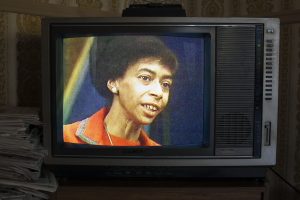At Tribeca Film Festival 2019, fair use played a big role in getting the documentary films made. Several filmmakers found fair use an essential tool in making their work. (CMSI co-facilitated, on behalf of five documentary filmmaker organizations, the groundbreaking Documentary Filmmakers’ Statement of Best Practices in Fair Use.)
Cheerleaders vs. the NFL.

Filmmaker Yu Gu believes fair use enables telling truth to power.
Yu Gu’s A Woman’s Work: The NFL’s Cheerleader Problem follows several cheerleaders who have sued football teams and the NFL for fair working conditions. For decades cheerleaders for major league football have worked for pennies or for free, while even the mascots earn a living wage. In A Woman’s Work, Yu Gu said, “some footage is archival, and we made a clear decision to use that footage under fair use, because you’re examining the world of football and you’re using it a transformative way.
For her, this was both a useful tool and a principle: “For documentarians, when you are speaking truth to power, when you are not flattering a giant corporation, you have to be resourceful in order to include the world you are examining. Fair use gives the power to filmmakers as storytellers to take mainstream culture, put out by monolithic media institutions, and make it about communities and people from the ground up.
“The ability and power to do that is indispensable to artistic expression.”
Beyond belief.
For They Know Not What They Do tells the story of four families whose children’s gay or trans identity made them reconsider their attitudes toward gender in light of their other religious values. For They Know Not What They Do’s director, Daniel Karslake. noted that fair use was crucial to making the film: “Pretty much everything in the film but the first few shots is fairly used. I couldn’t have made the film in the way it’s made without the fair use doctrine.”
The historical record.
Matt Wolf, the director of Recorder: The Marion Stokes Project, had a particular need for fair use. Marion Stokes, a civil rights

Civil rights activist Marion Stokes recorded decades of television, and only fair use could make it useable for the documentary Recorder.
activist, had a passion for documenting television, and kept VCRs recording television 24 hours a day for decades. Wolf interwove her idiosyncratic personal story with the historic events—and the seeming trivia too—that her recordings, held by the Internet Archive, now document for posterity.
“This film is only possible because of fair use,” Wolf said. “When you encounter an archive like this, you’re encountering stuff that was thrown into the trash can of history. Broadcasters didn’t even keep masters. Before we even started making the film, we consulted with Michael Donaldson [of Donaldson & Callif] about the overall creative approach.
“We wanted to create a conceptual framework in which we could fairly use, because it would be impossible to track down all the rightsholders. The film unfolds in a timeline, and is itself a work of media criticism.” The raw material that Wolf digitized will be available to other filmmakers as well, at the Internet Archive.
Fair use was evident in most of the documentaries, in fact. Donaldson & Callif, one of the largest films to handle fair use for independent documentarians, had 30 clients with films in the Tribeca Film Festival.
